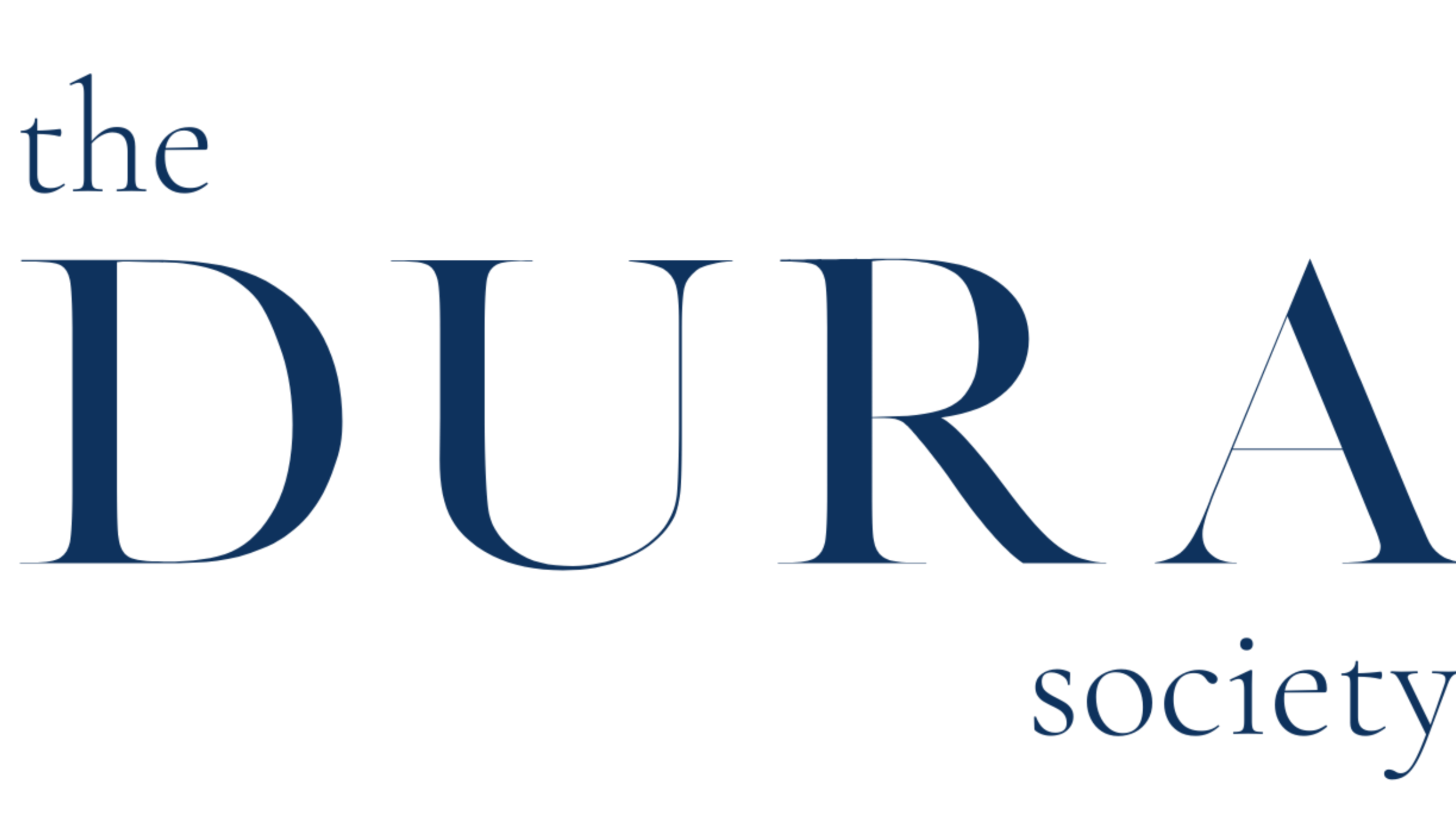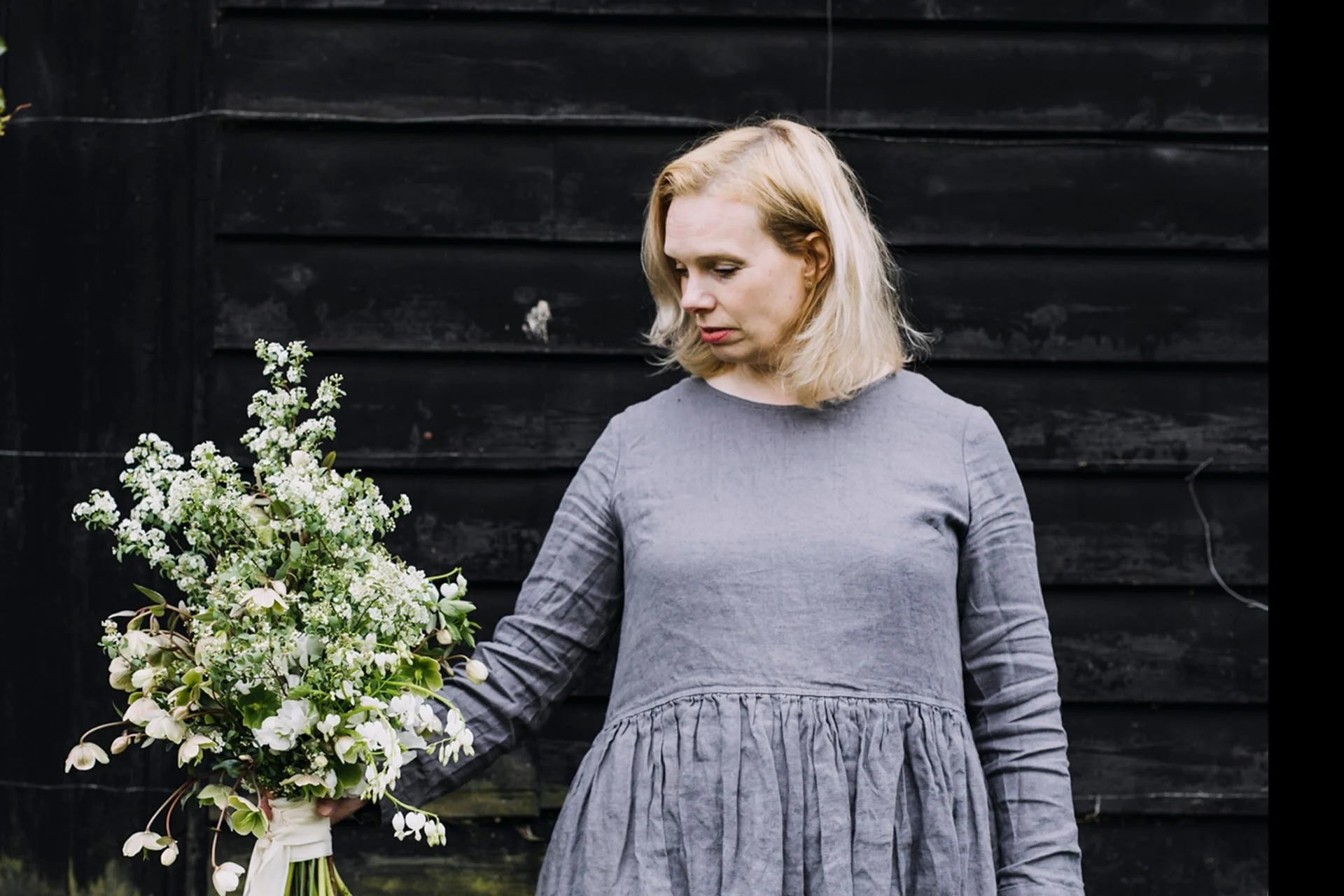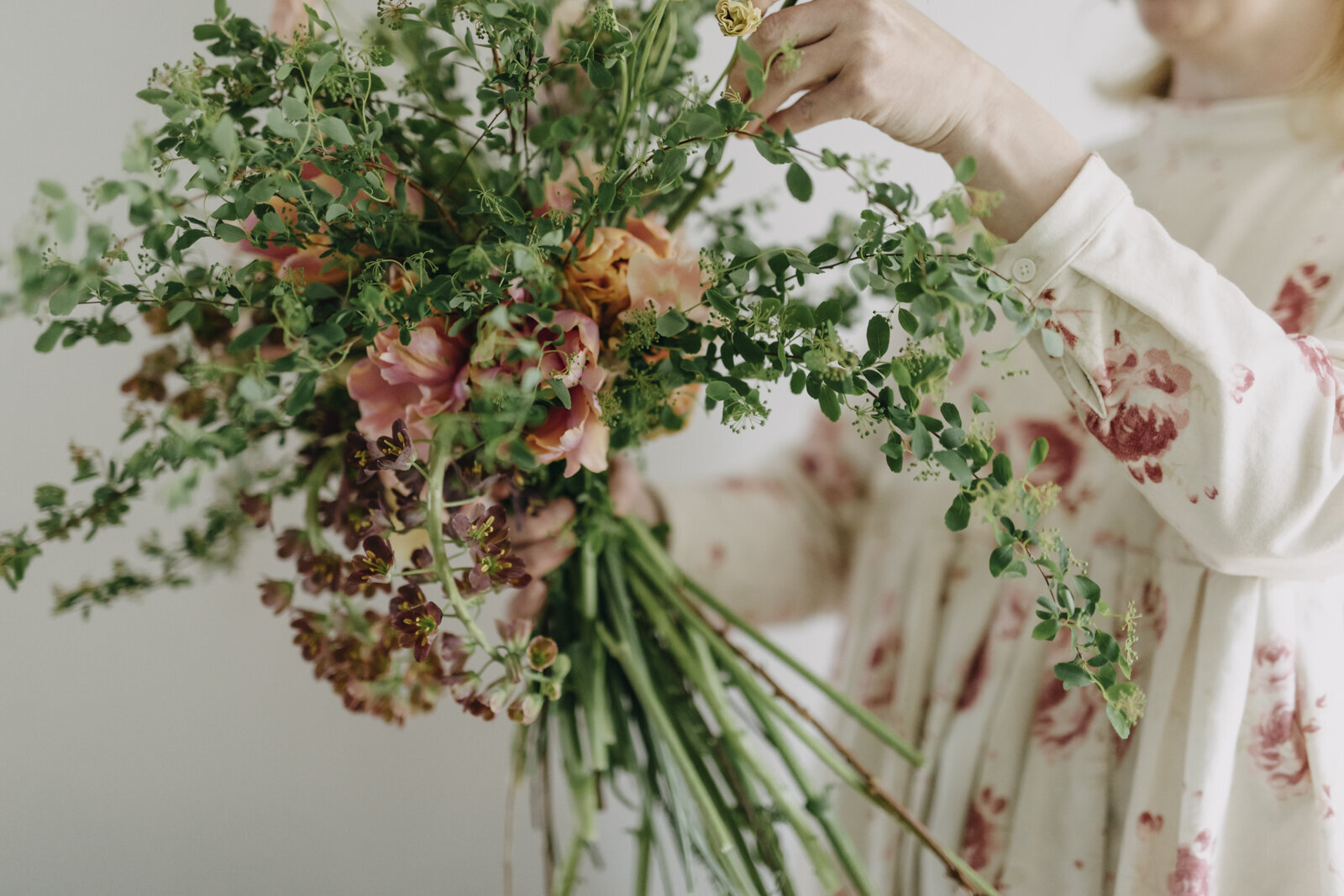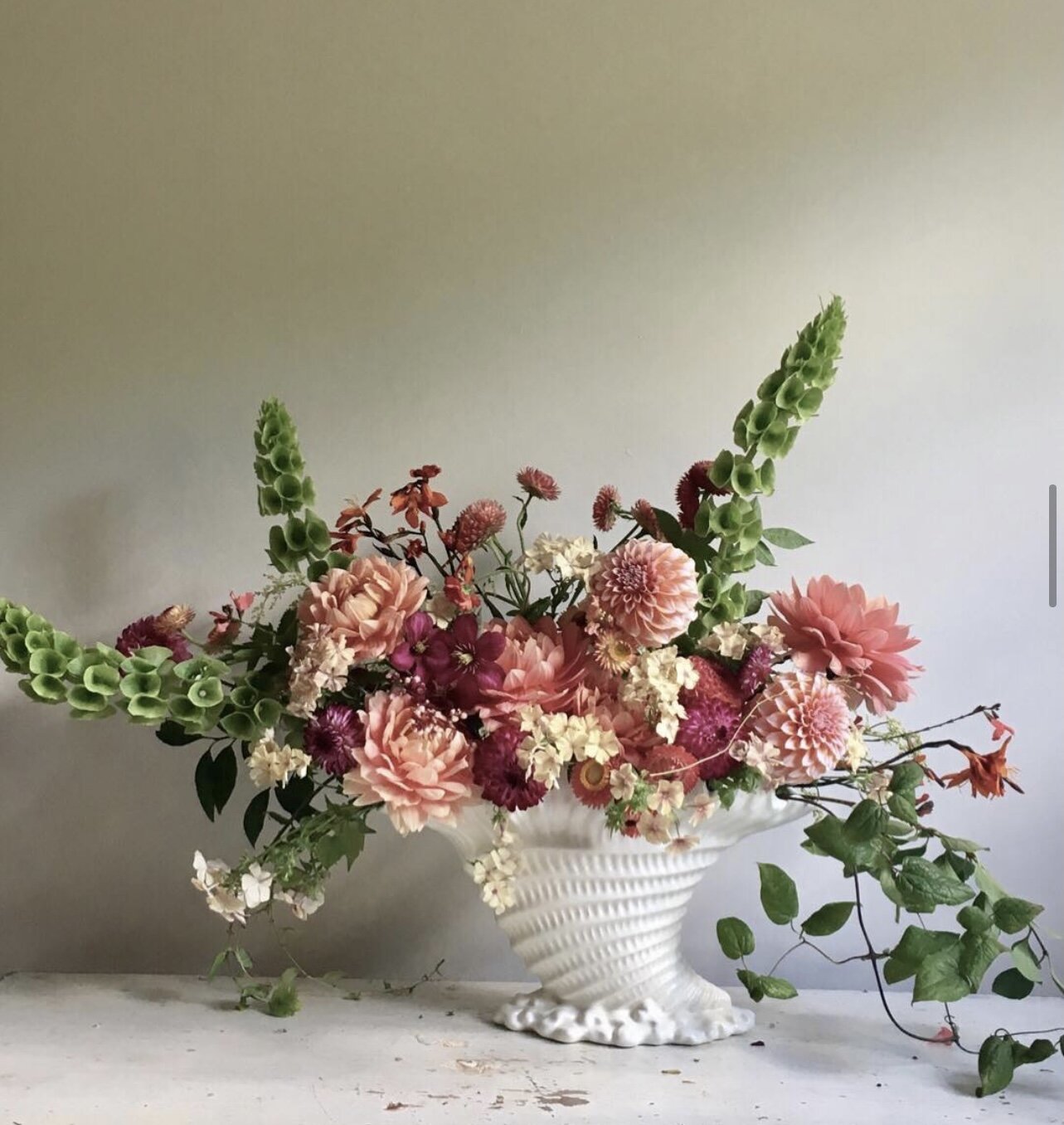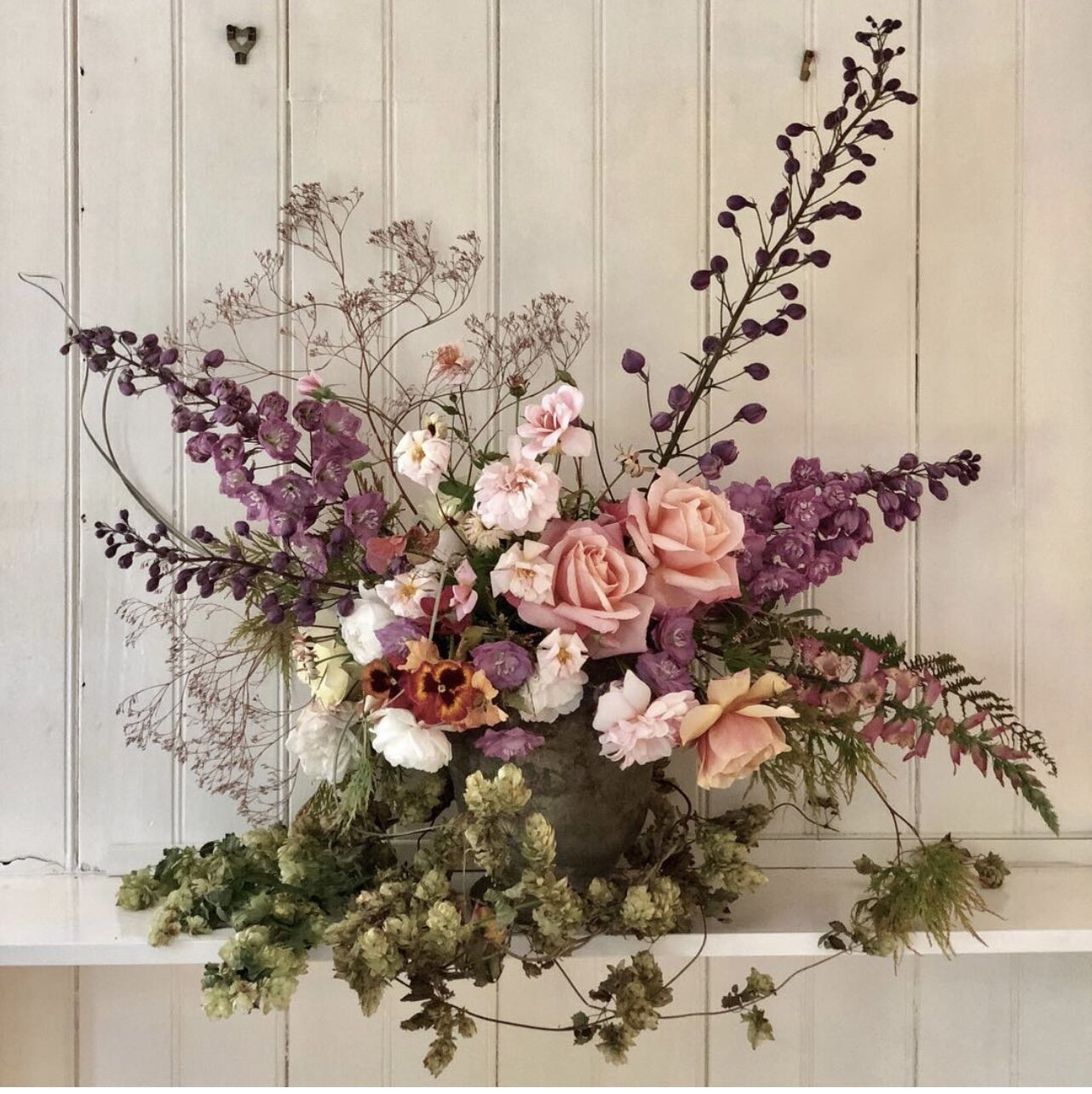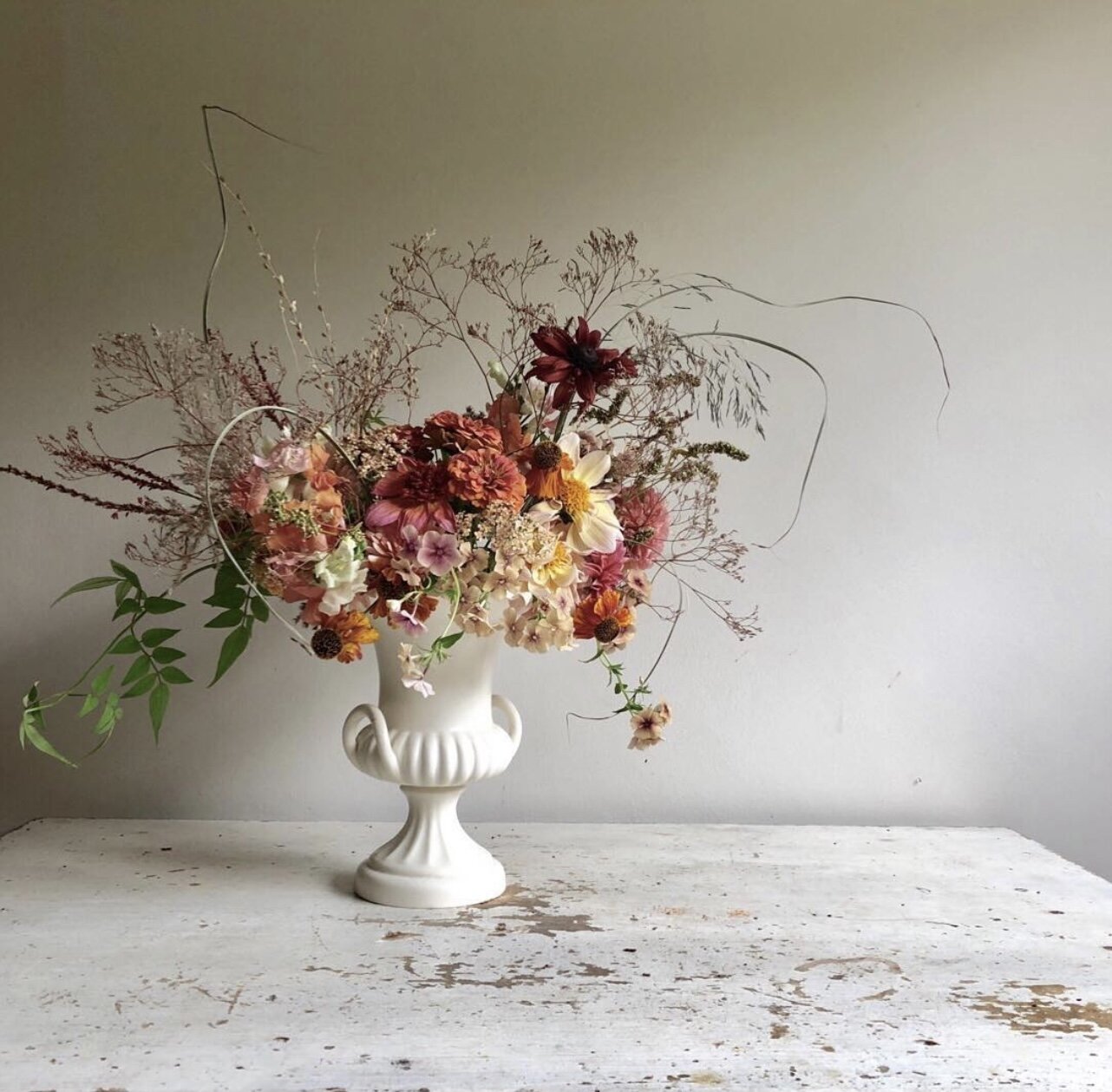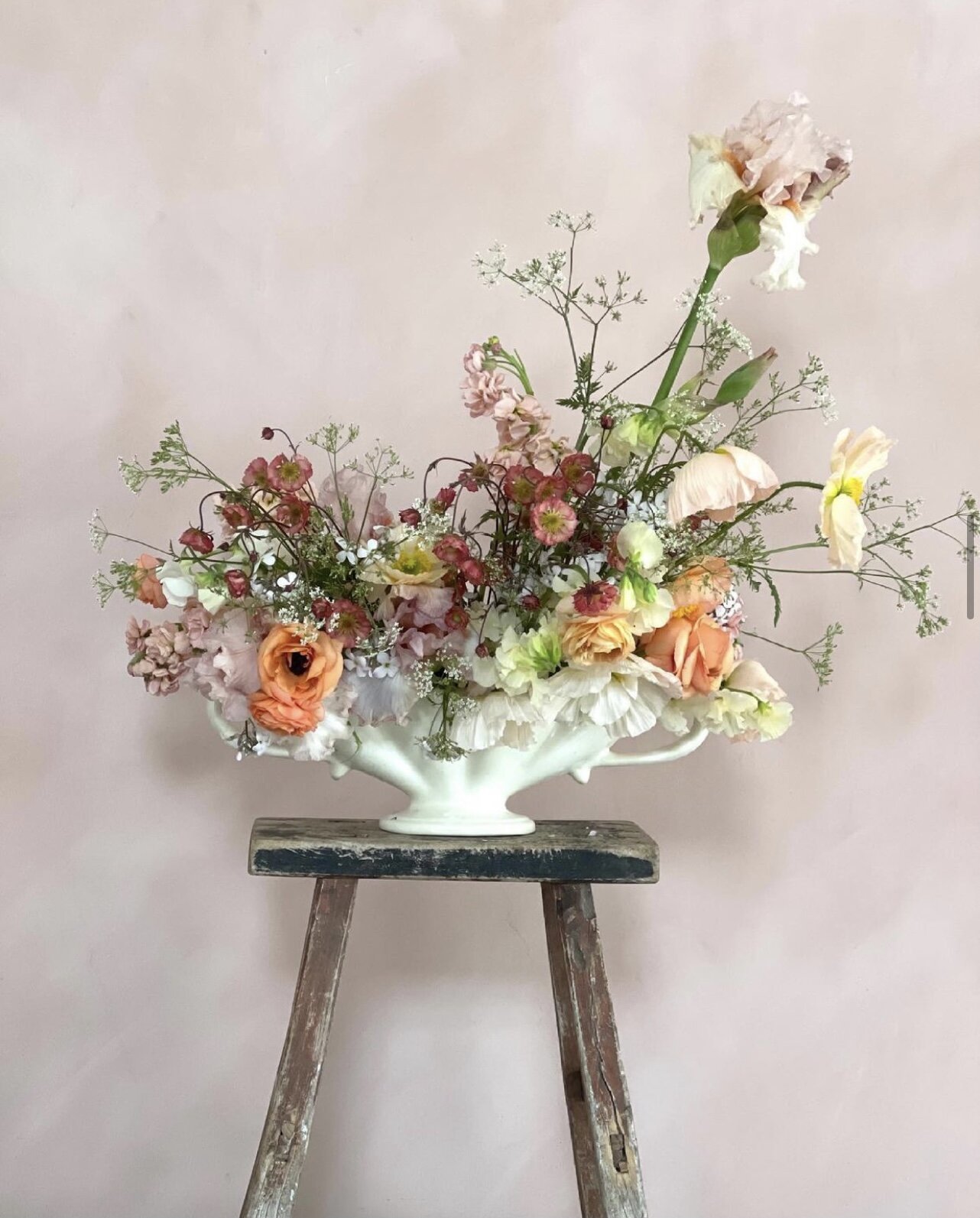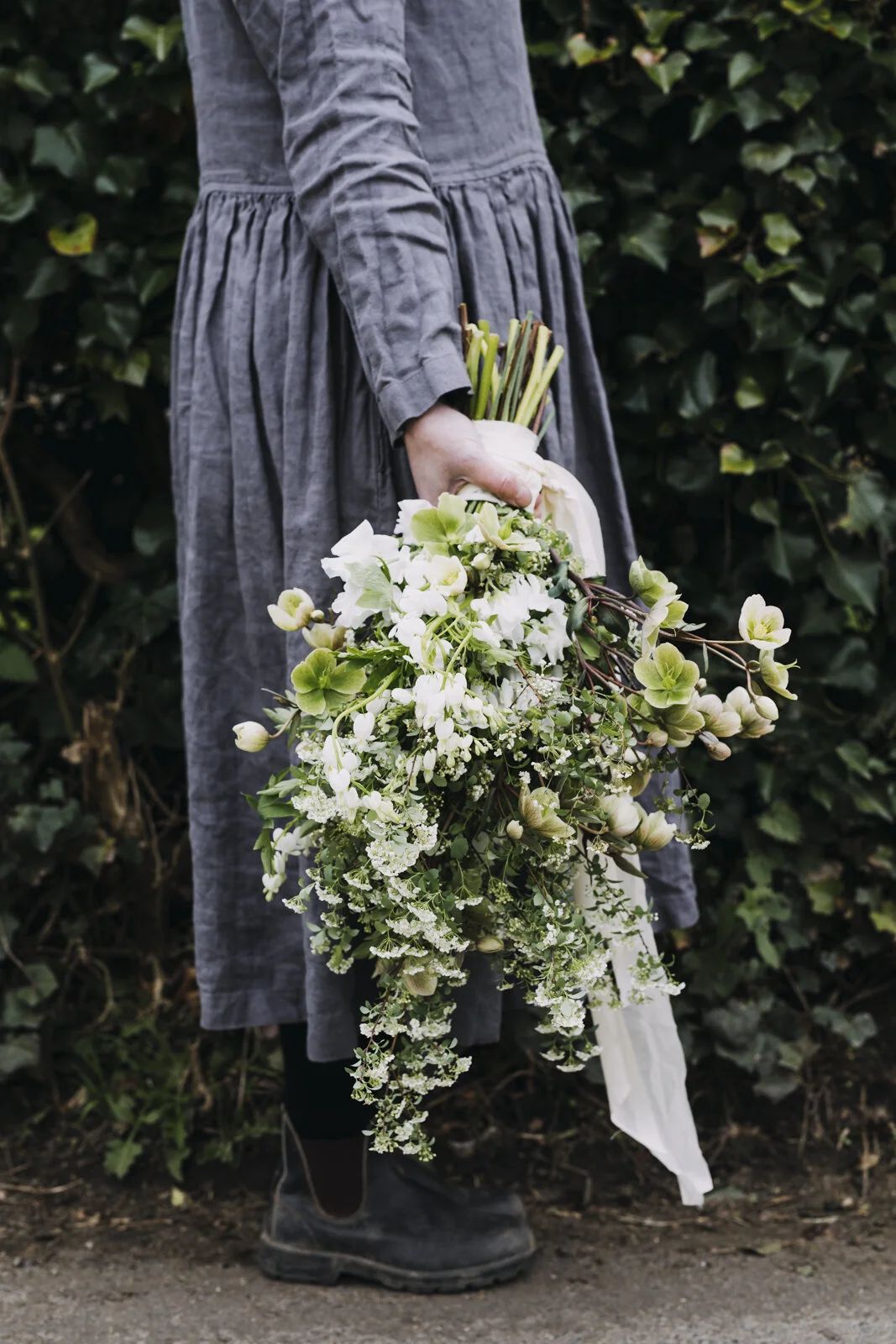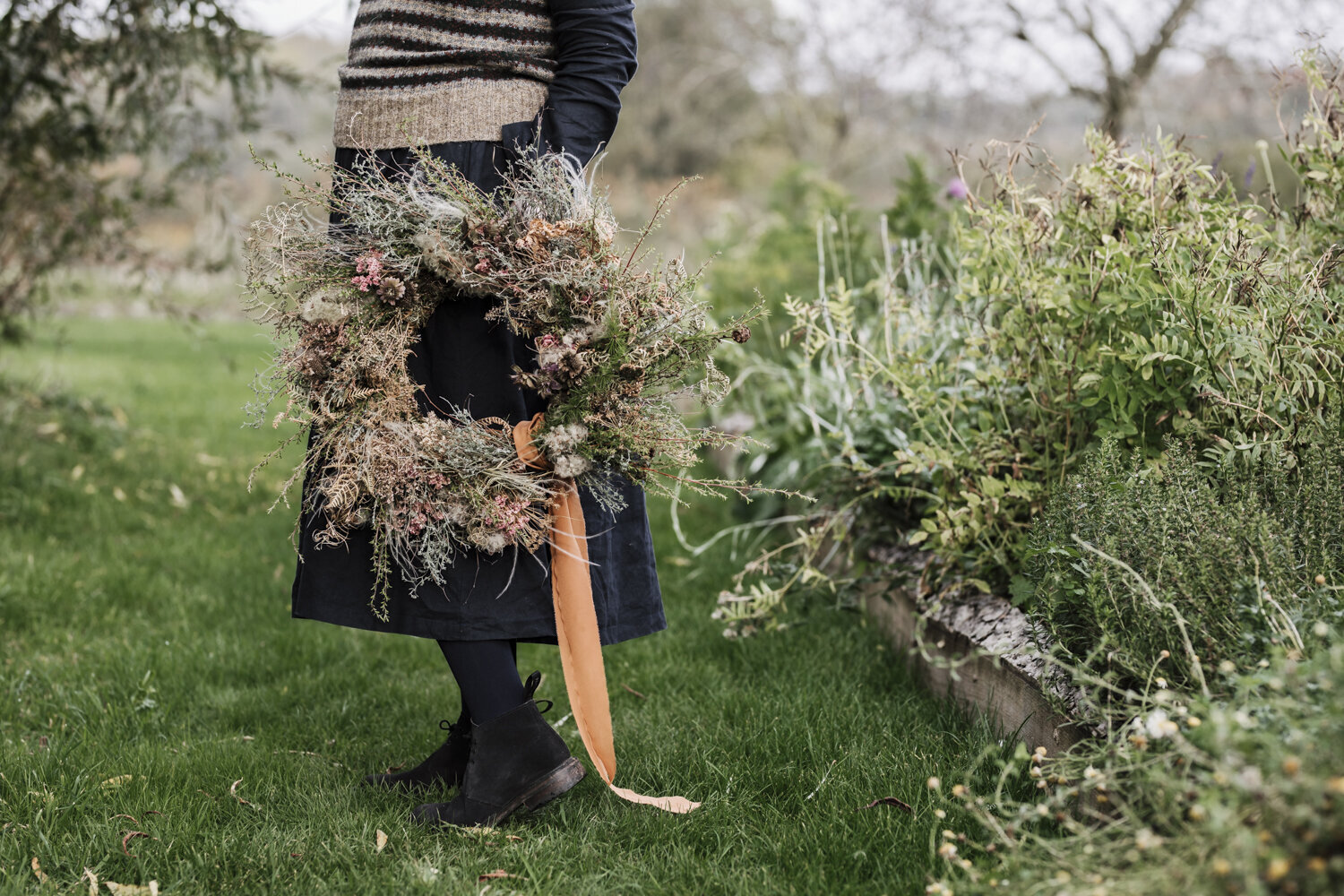Introducing Claire Bowen, florist, author and Founder of Honeysuckle and Hilda
Clare Bowen by Eva Nemeth
Meet Claire Bowen, florist, author and founder of Honeysuckle and Hilda. Here she shares her inspiration for flowers from both an aesthetic and a healing perspective, her attitude to money, and the importance of environmental awareness within floristry.
“I think I would define wealth as being able to spend time with the people I love, not having to worry about whether I can pay the rent or bills, being able to help other people, with the odd treat or two for myself.”
website | instagram
“I would describe myself as an environmentally aware florist who aims to leave the lowest possible footprint or, better still, has a positive impact on what’s around me. My style is very naturalistic and inspired by the garden, it is always asymmetrical and brimming over - I love big, blousy blooms! I am also a published author. I live in South Oxfordshire with my husband, Charles, two dogs Honeysuckle and Hilda, and a saggy old cloth cat called Cecil. My studio is located in our garden which is approximately 1/3 acre - I’m still a novice gardener and learning so much as I go along.”
Photo by Eva Nemeth
What inspired you to become a florist and what was the process to start building your brand?
I grew up in London but always hankered after the countryside. I loved flowers and moved to Hackney in 2004 (before it was popular) so I could be near the flower market at Columbia Road, which I visited each Sunday.
I read an article in Red magazine one day and it showed a photo of a lady in her garden with a wheel barrow and a dog, and I knew that was what I wanted, but didn't know how to go about it, or how I would fund it, given I was really earning just enough to pay the mortgage and my bills at the time. Unfortunately I was very poorly and had to take three years off work sick and by the time I was ready to return, they had, unsurprisingly, made my role redundant. However, the pay off I received was very generous. The old me would have gone straight out to find another job and put that money in the bank, but going through such a life changing event made me think differently. When I was first diagnosed, I was told that my tumour might be operable but it if wasn’t, it could be a matter of months.
Luckily for me, my tumour was curable, but I spent many long and lonely hours realising that I had been so busy worrying about finances and the future that I hadn’t done any of the things I wanted to do, and now they might not be relevant, and that annoyed me.
So, I decided to go take some flower classes with some amazing florists whose work I had admired on Instagram, just to try my hand at it. I started posting my flowers online, and soon people started to message me to ask if I taught classes or did weddings. My following grew quite quickly at the beginning, which I hadn’t expected at all, so I agreed to do a couple of small weddings to start with, and taught a class or two in our kitchen in London… and it all kind of snowballed from there.
Who are your clients?
My clients vary quite a lot, actually, I’ve had students from as far away as Brazil and the US, and some much more local ones. Some are already florists who are seeking to look at flowers from a different angle, some are people who attend just for fun.
I don’t do as many weddings as I used to, but typically the clients I work with have approached me because they like my style and environmental ethos. My style is quite flower heavy, so I have to factor this in to my costings.
What does a typical day look like for you?
It is very different types of day since the pandemic began as most weddings and gatherings were cancelled and it was not possible to teach face to face.
As well as writing my first book, I have also been very busy in the garden, which will hopefully stand me in good stead for the years to come. And when I’m not in the garden, I’m either walking the dogs or curled up with a book.
With a background in art history and environmental campaigning, how do you combine elements into your work?
In general terms, studying art history gets one used to looking at images and objects in a certain way, and gives a good idea of colour palettes, structure, texture and also perspective (when making an arrangement of any size, it is important to factor in the viewpoint from which it will be seen). When I was studying as a Post Grad at The Courtauld, there was an exhibition of Dutch Flower Paintings at The Dulwich Gallery, and I was mesmerised. At that time (the late 90s), still life painting was not at all in fashion, whereas now it is adored by florists everywhere.
I began campaigning around 2008 which is quite a few years before I started flowering. I came into the industry at a time where almost all florists still used floral foam, and gardeners were not aware of the dangers of herbicides and pesticides like glyphosate. Most flowers were imported from Holland. Things have changed so much of late - I used to feel very out on a limb, and people told me not to make life difficult for myself, but actually the tide has finally turned and it feels like we are making progress. So many wonderful British flower farms have sprung up, and that is such a joy. The irony is that floristry, which takes nature as its subject matter and inspiration, is an industry that can be very damaging to the environment if sustainable methods are not used.
What would you say are the three biggest floral trends for 2021 and beyond?
1. Foam free flower arranging (the green stuff is highly toxic and bad for both the planet and our health). There are a number of other mechanics that can be used in its place. Even the RHS have now banned it from their flower shows, which is great news.
2. Dried Flowers have had a real resurgence. They have shed their Miss Haversham type image and become v popular. Many florists now use dried flowers during the winter months instead of importing fresh ones from abroad. I like to also mix some dried flowers into my summer arrangements - it gives a further variety in texture and tone and also looks more like something you would find in the garden.
3. Ikebana, the Japanese art of flower arrangement, is becoming increasingly popular in the West. I have attended a few classes, but have a long held dream to visit Japan one day, and meeting some Ikebana teachers out there would be wonderful.
Tell us about The Healing Power of Flowers and the inspiration for your book.
In January 2020, I received an email from an editor at Penguin Random House, asking me if i would like to write a book (The Healing Power of Flowers). She had come cross my blog and had enjoyed it and decided to approach me (it’s not normally that way around, I was v lucky).
The book itself lists 80 different flowers and foliage and talks about each one’s healing powers or attributes, it draws from Victorian floriography of course, as well as Eastern traditions and cultures. Sometimes I talk about the aromatherapeutic property of the flower or its medicinal qualities.
The aim of the book is to give the reader ideas of what flowers to gift to someone for different occasions, based upon the ingredients they choose. It also highlights the importance of sustainable practices and has sections on flower pressing, how to dry flowers and also how to make a simple bouquet.
Future goals and vision for your work?
As I mentioned earlier I am still very much a novice gardener but also a very enthusiastic one. Having never had a garden before, I’m becoming slightly obsessed with plants, and have acquired really rather a lot through rare plant fairs and local flower farms. So I've been busy planting in the hope of having a huge abundance of flowers next year, and am planning my cutting garden to provide more blooms for weddings and events.
My hope is that I will be teaching sustainable flower techniques with most plants from my garden and I will create a wonderful sanctuary for wildlife too. I have found three toads in the last week, and get very excited when I see them. I’m planting lots of insect friendly varieties to try and work with nature to keep pests at bay.
I’m also in the very early stages of my next book, which will be inspired a lot by the garden here, and I’m really looking forward to that.
Lastly, I've just had agreement that we can add a new member to the family, and I’m currently researching tortoise enclosures as a result.
Biggest lesson learnt through Covid?
Tricky one, because both my husband and I had it very early on and were quite badly affected. The fact we came out of the other side put pretty much everything into perspective. As well as losing all my income from events and classes, I also had to let a cutting garden full of flowers go to waste - I had planted the autumn before with no idea what was on the horizon. Luckily, my studio is part of our home, and so I didn’t have the struggles that some people had with rents and overheads.
Photo by Eva Nemeth
What do you wish you had known before you started?
I think I had a very romantic notion of what it would be like to do wedding/ event flowers, but the reality is that it’s very time consuming, and requires a lot of labour on the days leading up to the wedding. People often say that wedding suppliers “bump up” their prices when weddings are mentioned but they are not taking into account just how much is involved. If you come and buy a bouquet from a flower shop one day, picked from a selection what they happen to have in that day, that is very different to the process involved in, say, a wedding bouquet. It takes me on average 2-3 hours to make a wedding bouquet, and before that has happened there will have been emails, meetings, Pinterest boards, and the acquiring of often very specific flowers. All of that takes up time.
I’m not good at making money on weddings, mainly because I so want the client (s) to be happy on their big day that I tend to go overboard with flower shopping and forget I have to pay myself. These days I only do a few each season, as I like to work with people who already know my work and trust me, so I can create something really special and have that satisfaction at the end of the day.
What are your 5 go-to tips for running a floristry business?
Be flexible
Team up with a trusted friend wherever possible
Enjoy what you do, because this profession is not well paid - it’s more of a vocation than a way to earn a good living
Don’t take mistakes to heart - learn from them, then move on
Allow some time to recover in between big jobs as it can be physically exhausting
W E A L T H
How would you describe your relationship with money and finances?
Ahem. *see above*.
How do you define wealth?
Ah, I like this question. My mother worked in The City of London and ran her own fund management company. For many years she was hugely successful, but in the end she burnt out and got too stressed. She made a lot of money financially, but she clearly wasn’t happy with life. When I told her I wasn’t going to follow in her footsteps, she was disappointed, but I’m not motivated by wealth or status per se, I don’t want a fancy car or an expensive handbag - my ambitions only go as far as wanting to be happy and secure in my home with my family (albeit an unconventional one), with the occasional trip to Somerset or Sussex and maybe some plant shopping.
So, I think I would define wealth as being able to spend time with the people I love, not having to worry about whether I can pay the rent or bills, being able to help other people, with the odd treat or two for myself. Success is about so much more than just money.
Best financial decision you have ever made (business or personal)?
In 1999, I bought a tiny flat in a scruffy street near Battersea Park. I cobbled together a 5% deposit and managed to get an interest only mortgage and no one really did much diligence into affordability. Even so, I couldn't afford to go on holiday for over a decade, and sometimes I had to walk to work because I couldn’t afford the bus fare. But I kept those payments up, and the money I had made through that purchase supplements my florist’s income now. I recently sold my flat and gave my sister (who is 10 years younger than me) a generous deposit to buy her first flat, as I am aware that it was people like me who benefitted from the price rises, and it wouldn’t be possible for her to get a foot on the ladder any other way. So it seemed the fair thing to do.
Photo by Eva Nemeth
What did you learn about finance and money when you were growing up?
Not a lot that was positive, I’m afraid. I didn’t have any real interest in money other than as a means to an end. I didn’t understand my Mother’s job fully, nor indeed my husband’s later on. What I do know is that I would want any income to have been achieved without the exploitation of people or the planet. I realise that’s very idealised approach, but that is how I see it.
Who manages the finances in your household?
My husband, by and large.
Which areas of finance do you wish you knew more about?
I’m really interested in companies and technology that help to fight climate change - my husband is currently advising a Green Angel Syndicate and some of the work is really very interesting.
Do you currently invest? If so, in what and why?
Not yet, but when I do hope to build up a small portfolio of socially conscious/ environmentally beneficial investments, even if the yields are smaller (though there is nothing to say that they necessarily would be).
Guilty pleasure purchase?
Dresses, flowers and books.
Money secret?
How much I’ve actually spent on plants and flowers this summer, versus what my husband thinks I’ve spent.
Role Model? Constance Spry
What’s next for you? Hopefully another book, a blossoming garden and a tortoise.
Currently reading and listening to?
My favourite podcast is by Jennifer Jewell of Cultivating Place.
I’m currently reading Miss Buncle’s Book by D E Stevenson, Wilding by Isabella Tree and Letters to the Earth (various authors).
Top 5 Instagram accounts to follow?
If you could invite 3 artists for dinner, dead or alive, who would you invite and why?
Gertrude Stein (she moved to Paris in 1903, and must have met so many brilliant French artists at that time and could tell me all about La Belle Epoque).
Gertrude Jekyll (she could give me planting tips and tell me what she thinks I should put in the garden next, and where)
Beth Chatto (for the same reasons as Gertrude Jekyll but from a different perspective. Also, I don’t think they'd agree on everything, so it could be quite a lively discussion!).
Thank you Claire
